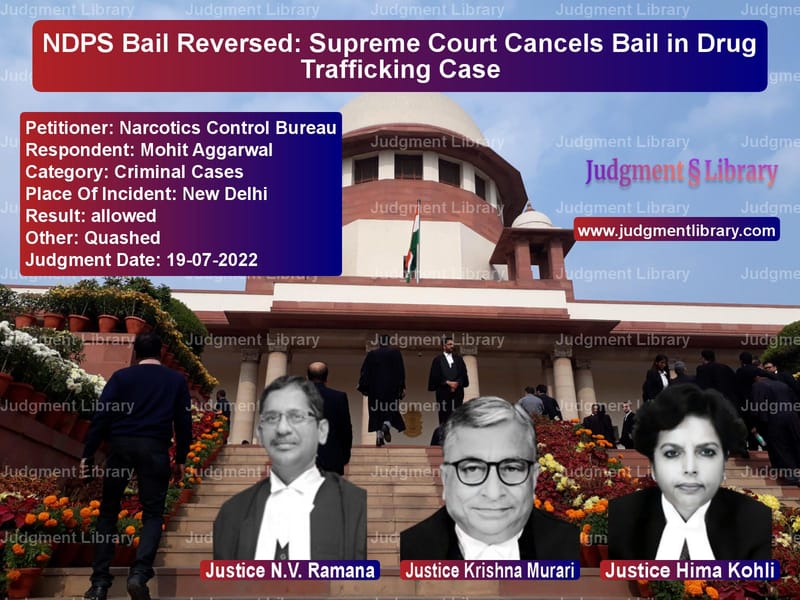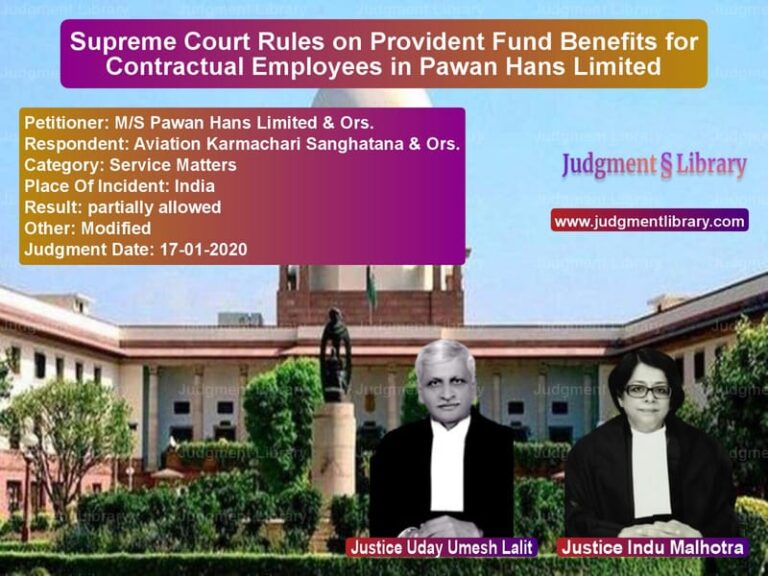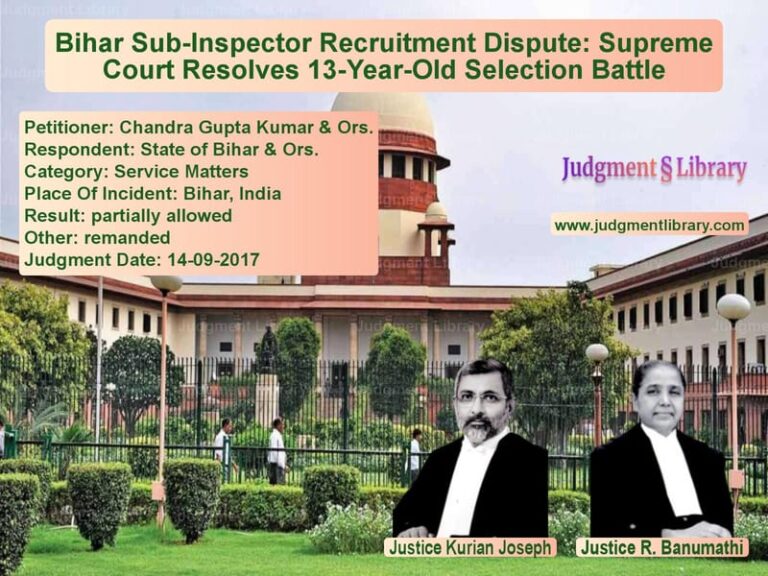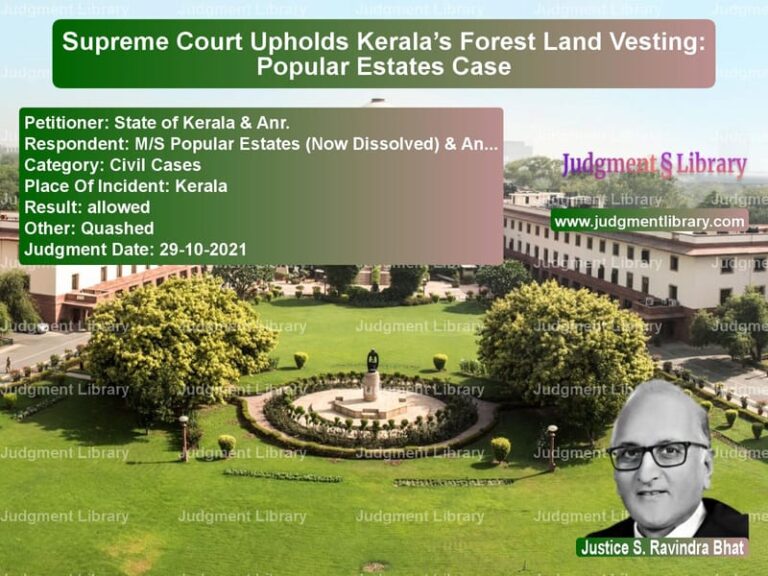NDPS Bail Reversed: Supreme Court Cancels Bail in Drug Trafficking Case
The case of Narcotics Control Bureau vs. Mohit Aggarwal is a significant judgment concerning the strict application of the Narcotic Drugs and Psychotropic Substances (NDPS) Act, particularly regarding bail provisions for drug trafficking offenses. The Supreme Court was called upon to decide whether the Delhi High Court was justified in granting bail to an accused charged with commercial quantities of narcotic drugs.
Background of the Case
The appellant, Narcotics Control Bureau (NCB), challenged the order of the Delhi High Court, which had granted bail to the respondent, Mohit Aggarwal. The respondent was arrested under Sections 8, 22, and 29 of the NDPS Act for his alleged involvement in the trafficking of Tramadol, a banned psychotropic substance.
The case against Mohit Aggarwal began when the NCB received secret information about a courier package containing narcotic substances. The package, booked from Agra and destined for Ludhiana, was intercepted at a warehouse in New Delhi. Upon inspection, officials recovered 50,000 Tramadol tablets weighing 20 kg. Since the consignment lacked proper documentation and was falsely declared as surgical items, the NCB initiated legal proceedings.
Read also: https://judgmentlibrary.com/supreme-court-upholds-conviction-in-andhra-pradesh-murder-case/
The accused, Gaurav Kumar Aggarwal, who had booked the parcel, was arrested and later made statements under Section 67 of the NDPS Act, implicating Mohit Aggarwal as his supplier. Further investigation led to the recovery of a large quantity of additional contraband from multiple locations.
Prosecution’s Arguments
The NCB, represented by the Additional Solicitor General, contended that:
- The High Court erred in granting bail by overlooking the commercial quantity of drugs involved, which attracts stringent bail conditions under Section 37 of the NDPS Act.
- Although the drugs were not directly recovered from Mohit Aggarwal, his involvement was established through statements and electronic evidence, including call data records.
- The High Court failed to consider the embargo placed by Section 37, which mandates that bail can only be granted when the court is satisfied that the accused is not guilty and is unlikely to commit further offenses.
- Previous rulings, including the case of State of Kerala vs. Rajesh, emphasize that bail should not be granted in NDPS cases unless strong exculpatory evidence exists.
- The accused was part of a larger network involved in the illegal sale of narcotic drugs, making his release a potential threat to ongoing investigations.
Defense’s Arguments
Mohit Aggarwal’s defense argued:
- He was a small-time shopkeeper dealing in medicinal drugs and had no direct link to the seized consignment.
- No recovery was made from his premises, and the only evidence against him was statements from co-accused, which are inadmissible under the ruling in Tofan Singh vs. State of Tamil Nadu.
- The High Court had rightly granted bail since he had already spent over a year in custody, and there was no likelihood of tampering with evidence.
Supreme Court’s Observations
The Supreme Court, comprising Chief Justice N.V. Ramana, Justice Krishna Murari, and Justice Hima Kohli, examined the facts and legal framework of the NDPS Act. The Court noted:
“The expression ‘reasonable grounds’ under Section 37 means more than prima facie grounds. It contemplates substantial probable cause to believe that the accused is not guilty of the alleged offense.”
The Court highlighted that:
- Section 37 imposes a double condition for granting bail: (1) The prosecution must be given an opportunity to oppose the bail, and (2) The court must be satisfied that the accused is not guilty.
- The High Court ignored vital circumstantial evidence, including the statements of co-accused and the seizure of large quantities of drugs based on Mohit Aggarwal’s disclosures.
- Despite no direct recovery from the respondent, the case involved constructive possession, as the drugs were traced back to his network.
- The Court reaffirmed its ruling in State of Punjab vs. Baldev Singh that procedural lapses in drug seizures do not automatically render a case weak.
Final Ruling
The Supreme Court set aside the bail order and directed that Mohit Aggarwal be taken back into custody immediately. The judgment concluded:
“The limitations of Section 37 of the NDPS Act have not been satisfied. It is not safe to conclude that the accused is not guilty of the offense. The impugned order granting bail is quashed.”
The Court emphasized that granting bail in NDPS cases must be based on strong exculpatory evidence and not merely on procedural irregularities.
Key Takeaways
- Strict bail conditions in NDPS cases: Bail can only be granted when the court is convinced of the accused’s innocence.
- Constructive possession applies: Even if drugs are not recovered directly from the accused, circumstantial evidence can establish involvement.
- Statements under Section 67: While confessional statements alone cannot be the basis for conviction, they can be used to corroborate other evidence.
- Judicial caution required: High Courts must ensure strict compliance with the NDPS Act before granting bail.
Conclusion
The ruling in Narcotics Control Bureau vs. Mohit Aggarwal reinforces the stringent approach taken by courts in drug trafficking cases. The judgment ensures that accused individuals cannot easily secure bail in commercial drug cases unless they present strong evidence proving their non-involvement. This decision upholds the legislative intent behind the NDPS Act to curb drug trafficking and safeguard public health.
Petitioner Name: Narcotics Control Bureau.Respondent Name: Mohit Aggarwal.Judgment By: Justice N.V. Ramana, Justice Krishna Murari, Justice Hima Kohli.Place Of Incident: New Delhi.Judgment Date: 19-07-2022.
Don’t miss out on the full details! Download the complete judgment in PDF format below and gain valuable insights instantly!
Download Judgment: narcotics-control-bu-vs-mohit-aggarwal-supreme-court-of-india-judgment-dated-19-07-2022.pdf
Directly Download Judgment: Directly download this Judgment
See all petitions in Drug Possession Cases
See all petitions in Bail and Anticipatory Bail
See all petitions in Legal Malpractice
See all petitions in Other Cases
See all petitions in Judgment by N.V. Ramana
See all petitions in Judgment by Krishna Murari
See all petitions in Judgment by Hima Kohli
See all petitions in allowed
See all petitions in Quashed
See all petitions in supreme court of India judgments July 2022
See all petitions in 2022 judgments
See all posts in Criminal Cases Category
See all allowed petitions in Criminal Cases Category
See all Dismissed petitions in Criminal Cases Category
See all partially allowed petitions in Criminal Cases Category







